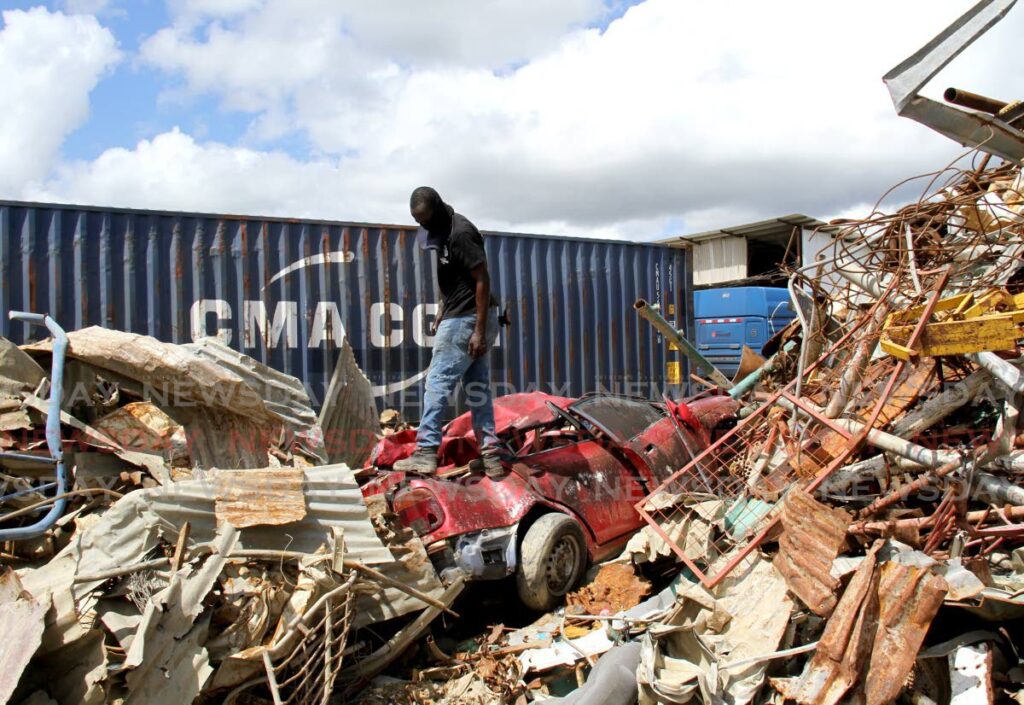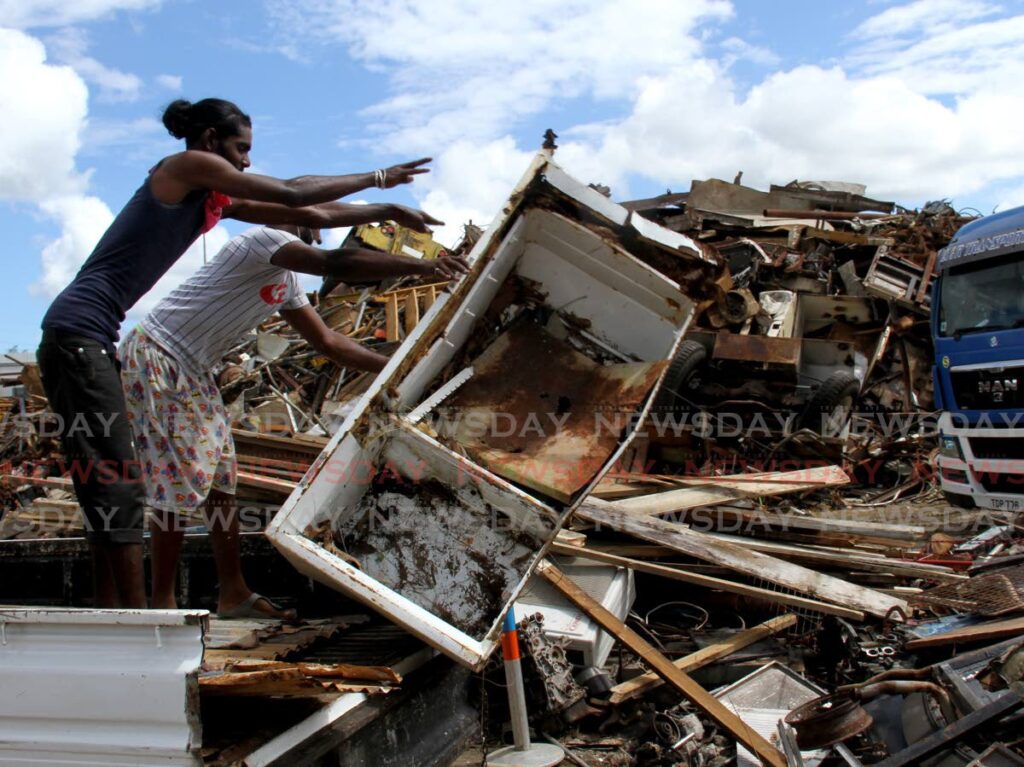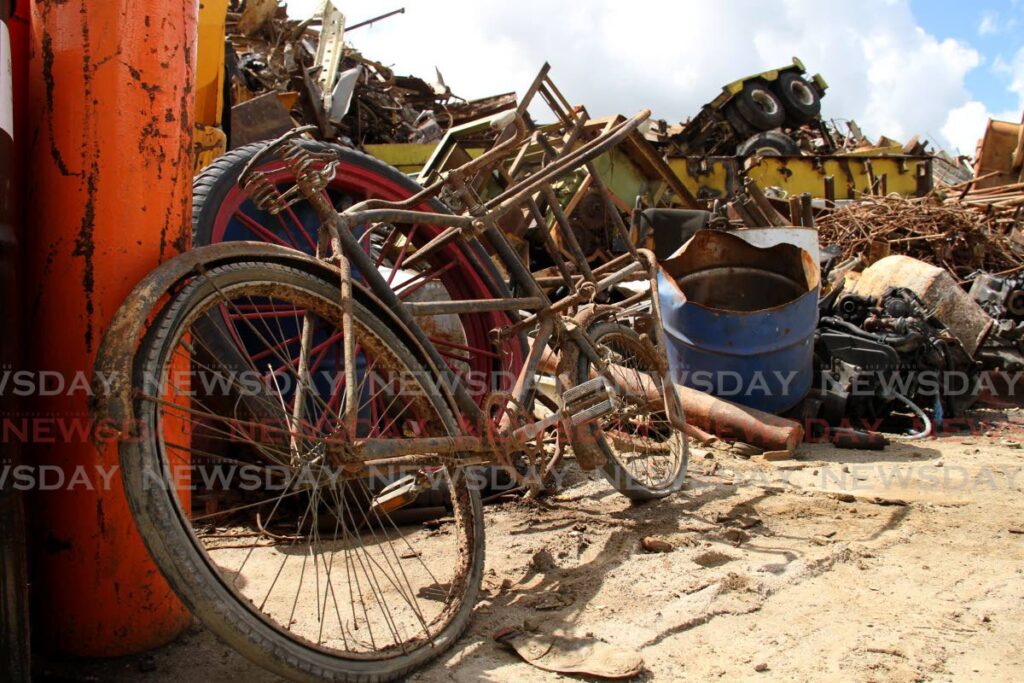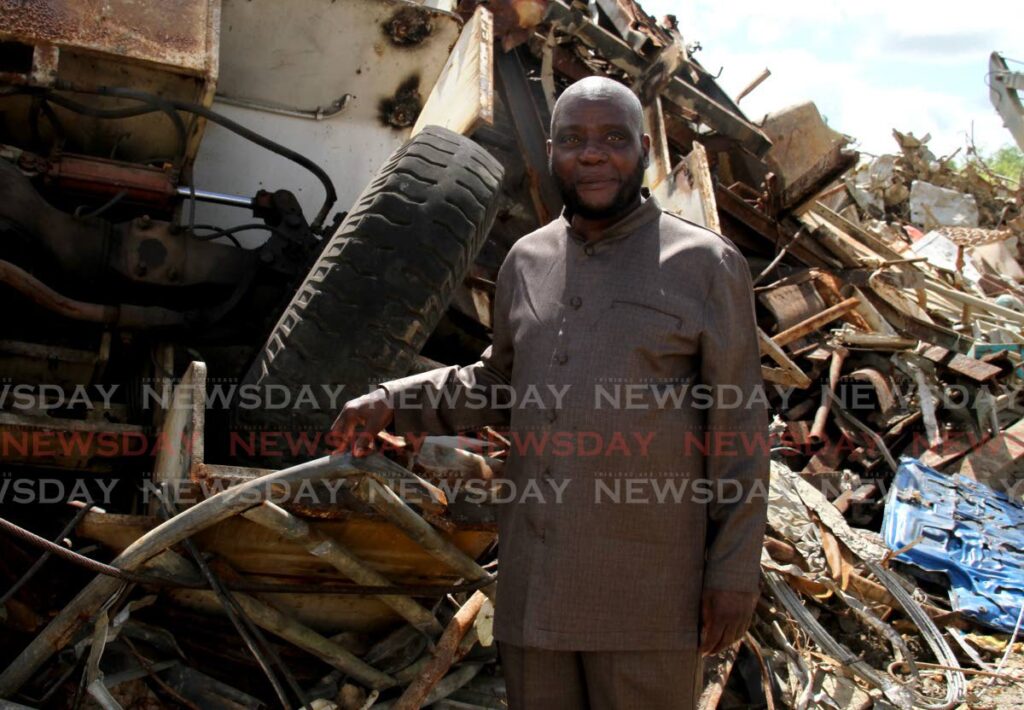Scrap iron trade a goldmine: Dealers call for government policy

Navin Jagmohan drove into the scrap yard on Bypass Road, Kelly Village, on Wednesday morning with a smile on his face and the tray of his Nissan van full of discarded metal.
His haul was conservative according to him – pieces of a chassis for a car, car doors, sheet metal and old galvanise were among other items on his tray. He rolled past mountains of scrap iron straight to a large scale where his cargo was weighed and checked.
From there he rolled closer to the centre of the yard to offload his pile onto the other mountains of metal. By the time he had offloaded and dealt with the brokers, he had about $800 in his hand.
But to him that was still a relatively small payout.
“Sometimes I could come here and leave with about $1,900,” he said.
He, however, planned to return that same day with another load. That load would bring home a much bigger pay day. Jagmohan, in his early 30s, told Business Day that he had been selling scrap iron since he was 13. His brothers, who are mechanics, supply him with scrap pulled from cars and trucks. Aside from that, he travels the East-West Corridor going into homes and villages brokering for scrap metal using the now local household phrase “buying scrap iron, old battery buying.”
Jagmohan was among several people who visited the scrapyard that day. Scrap dealers and regular people alike came in with old wires, and cables, scrapped cars, washing machines, old appliances – everything but the kitchen sink.
Actually, someone came with a kitchen sink.
The Bypass Road scrap yard is one of more than 120 scrap yards under the Scrap Iron Dealers Association, who have taken the scrap iron collection and export industry from a $96 million industry in 2010 to one that contributes more than $260 million to TT’s GDP today.
But while the industry continues to flourish, several parts remain severely under-regulated, leaving room for illegal activities and limiting the industry on the whole. This is why the president of the Scrap Iron Dealers Association, Allan Ferguson, is calling on government to finalise a scrap iron policy languishing since 2013. That, along with major shocks in the supply chain has put the multimillion dollar industry at risk.
Scrap iron industry – a vital sector
Ferguson told Business Day the industry does not only provide a vital service to the nation, free of charge, but added that the growing industry continues to benefit TT through bringing business and much needed foreign exchange to TT’s shores.

Ferguson, the owner of the Bypass Road scrapyard, said he started in the scrap iron business about 20 years ago. Before then, he worked in the construction industry.
“I liked the business so I got myself and my family involved. I had one of the smallest yards when I started off on Enterprise Street, Longdenville. I moved to two other locations and then we came here four years ago.”
He said getting involved with the industry has exposed him to people and recycling operations around the world. He said locally, there are about 20,000 people directly and indirectly involved in the industry, but the people who really drive the industry are the hard-working men and women who search the country to collect scrap and sell to dealers so they can make a dollar for themselves and their families.
“This industry is the only one where a poor man can go into the bush and look for scrap iron and come to a yard and make a little money,” he said. “This is the only industry which has assisted every home in the country without a cent from the government.”
“This industry is important, not just because we are doing it but because of the amount of people it employs. Sometimes people would have bad records or had just come out of prison and they don’t know what to do. We try to assist them and teach them how to be a better person in society.”
At his yard employees show up at about 7 am and work until about 5 pm. His employees are paid a starting salary of about $250 a day, and depending on rank in the yard – whether supervisor, manager, administration etc, the salary goes up.
Ferguson also makes it a point to ensure the workers are taken care of while in the yard. He provides lunch for his employees with the help of a cook who comes in on a daily basis, and fridges are also stocked with water and other beverages.

The scrap yard dealers buy grades of copper for between $19 and $21 a pound. “Clean” and “unclean” brass, which is brass without other metals, or plastics and with metals or plastics are bought for $7 and $3 a pound respectively, and solid iron and mixed iron goes for between $1,800 and $1,700 per tonne.
Ferguson said his ultimate goal is to revolutionise the recycling industry in TT.
“As a person who understands recycling I would like to remove all of these dumps and turn them into recycling parks,” he said.
“If you look at countries like Singapore and India which takes recycling very seriously it does a lot for the workforce and brings in a lot of revenue for their countries. If we go down that direction I think we could do the same for this country.”
More regulations needed
At the moment the scrap iron industry is regulated by The Old Metal and Marine Stores Act, proclaimed on August 26, 1904.
The act makes it illegal to operate a scrap iron dealership without a licence, which can be obtained through a licensing committee. Before someone could be licensed as a scrap iron dealer the yard where they are proposing to operate would have to be inspected by a police officer with jurisdiction in the area, and can be subject to inspections as regularly as required. Records are to be written in a log book in pen and the act restricts dealers to make any transactions with people under the age of 16.
The act also makes it an offence to fail to give information to police on people who obtain scrap metal through theft or fraud.
The act states that anyone who assaults, resists, opposes, hinders, prevents, or obstructs any person acting under and law, is guilty of an offence and is liable on summary conviction to a fine of $1,000. Dealers can also have their licences cancelled.
The restrictions are limited, first of all, to the scrap iron dealers and does not extend to the scrap iron collectors who, according to several reports, have developed the habit of trying to ply stolen scrap to dealers.
Several major state entities, including TSTT and TTEC and WASA, have complained on several occasions of theft by alleged scrap iron suppliers of copper wire, manhole covers, pumps and other items.

As recently as June, the owner of an unlicensed scrap metal yard in Port of Spain, 57-year-old Vejai Ramlakhan, was arrested by city police after a quantity of manhole covers and copper wire was recovered. Ramlakhan was granted a $50,000 bail and his matter is pending before a Port of Spain magistrate.
A policy was developed in 2013 by the Ministry of Trade and Industry with the intention to strengthen the regulatory framework, taking into account international best practices and national circumstance. The ministry hoped the policy would improve the licensing and monitoring system for the scrap metal industry, increase adherence to scrap metal best practices and reduce instances of theft.
Some of the measures included a cap on cash transactions, extended monitoring and record-keeping policies and heftier fines for poor practices and dealings with stolen items.
But, since the proposed policy was written it has remained languishing without being brought to Parliament.
“When I became the president in 2011 we asked to have a symposium with all the stakeholders and we agreed on a policy,” Ferguson said. “Earlier this year, the Minister of Trade said before the end of 2021 the ministry would go to Parliament with the policy. Up to today, nothing like that was done.”
It leaves the industry exposed to bad practices, Ferguson said. Since the current act does not extend to collectors, the dealers themselves have to come up with their own practices to treat with people bringing scrap iron to their yards.
In Ferguson’s case, he said when the collectors come to the yard, the cargo is weighed and and inspected. If there is anything suspicious looking in the cargo, workers ask for proof of ownership. If this is not satisfactorily provided, they turn the collectors away. Ferguson said the incidents have increased because of financial struggles coming out of the effects of covid19.
“We have to turn people away every day,” he said.
Petrotrin shut-down, foreign competition
Illegal activities are not the only challenges facing the industry. One major hindrance is the lack of high quality scrap metal which could be exported to major importers like India and China. Ferguson said the industry got most of its high grade scrap metal – HMS 1 and HMS 2 – from Petrotrin, and since it closed its doors in 2018 the industry has been clamouring for proper grade material.
“Since Petrotrin closed down, our industry has been under threat,” he said. “The material we are getting now is home materials – galvanise, fridges, stoves, washing machines. One country in the world that takes this material more than anywhere else is Taiwan. Most of our material goes there. If they close down operations today our industry would be in trouble.”

Ferguson, in a press conference held on Wednesday, criticised Trinidad Petroleum Holdings Ltd – the parent company which oversees Petrotrin assets through the Guaracara refinery – for not acting on offers and appeals to manage the disposal of scrap iron at the Petrotrin refinery.
“The reason we bid for Petrotrin material is because the material could save our industry. This industry is hurting.”
He said association members made requests, for more than a year, on the status of the tender on the removal of scrap iron in the refinery. The association sent a letter to Trinidad Petroleum with regard to a non-adherence to the state enterprise performance management monitoring system.
In a meeting with company officials, the association claimed materials were being taken out of the refinery without a tender being awarded.
Last Thursday, the company responded in a letter to the association saying a review was done on November 18, by the chairman of the Heritage Procurement and Disposal Advisory Committee (PIDAC).
In the letter, it said that interested parties were instructed to use the virtual tender box on the Heritage website and submit relevant documents by October 9. The letter said 22 responses were received of which seven didn’t provide the proper forms and were rejected as a result. The letter indicated that the association's submissions were not relevant to the particular bid. The letter added that it didn’t receive a bid from “any entity described as the Scrap Iron Dealers Association.”
The letter said the company received a google link by Ferguson instead.
“In this regard the submission received from Allan Ferguson could not be accessed for evaluation as the google link had expired by the October 15.”
The letter added that the google link did not adhere to the instructions set out by the company.
At the press conference, Ferguson questioned how the company was aware that submissions were missing if they were unable to open the file.
And trouble seems to be on the horizon with international buyers as well, as Taiwanese imports of ferrous scrap metal has lessened amid its government’s drive to reduce its reliance on nuclear power for electricity.
According to a report on Argus Media’s website, the country took the decision reduce its share of the overall energy mix and increase power generation from wind, hydro, solar and natural gas. But the infrastructure to manage the transition is not yet fully built causing electricity shortages and resulting in major blackouts across the entire country during May. The blackouts affected commercial, industrial and residential areas and lasted about 8-10 hours.
Ferguson added that a few foreign entities have also set up scrap yards and provide some minor competition.
He said there are about four scrapyards run by foreign entities. There is one in the Siparia area, another near Chaguanas, a third in Warrenville and a fourth in St Augustine. These yards are run by operators from China and India.
Help us revolutionise the industry
Still, Ferguson wishes to take the association and the industry to another level. He once again spoke of his plan to recover wrecked vessels from TT’s waters and cut the scrap metal found there to export.
“We are saying that more than 1,000 people will immediately get jobs when this project starts. It would be important for TT because it would bring in foreign exchange and strengthen the industry. That is why we want to take business to the sea.
He said it would take about two years to clear TT waters of its shipwrecks and would have an overall cost of $135 million but an initial investment of $45 million would be needed as a start.
“It would not finish there,” Ferguson said. “A lot of the ships are getting old. We could bring it in to cut it up. It would help our industry to keep moving forward. Those big ships that hold a lot of metal these are the ships that we are thinking of bringing in, and it is not only the metal that comes in, there is furniture, and other things that could be sold to the market in TT if we get our will.”
But the project would need the government’s support. Ferguson said the association would need access to a port and would also need tax breaks on particular items to break down the scrap metal into mill-ready pieces.
“We already signed contracts with investors to work with us. We had gone outside of TT to get investors to invest in this project. They already agreed to work with us. Because of the investors and our connections we were also able to bring in and sign up with one of the largest steel mills in the world.”
“This industry is an old industry which came out of the gold industry. There were people fighting the cause way before me. I am just trying to put more beef into it. Look at any country in the world and you can see how it is more organised. India, America they would step in and assist. This industry feeds thousands of people on a daily basis. Don’t take it away from them,” he said.

Comments
"Scrap iron trade a goldmine: Dealers call for government policy"